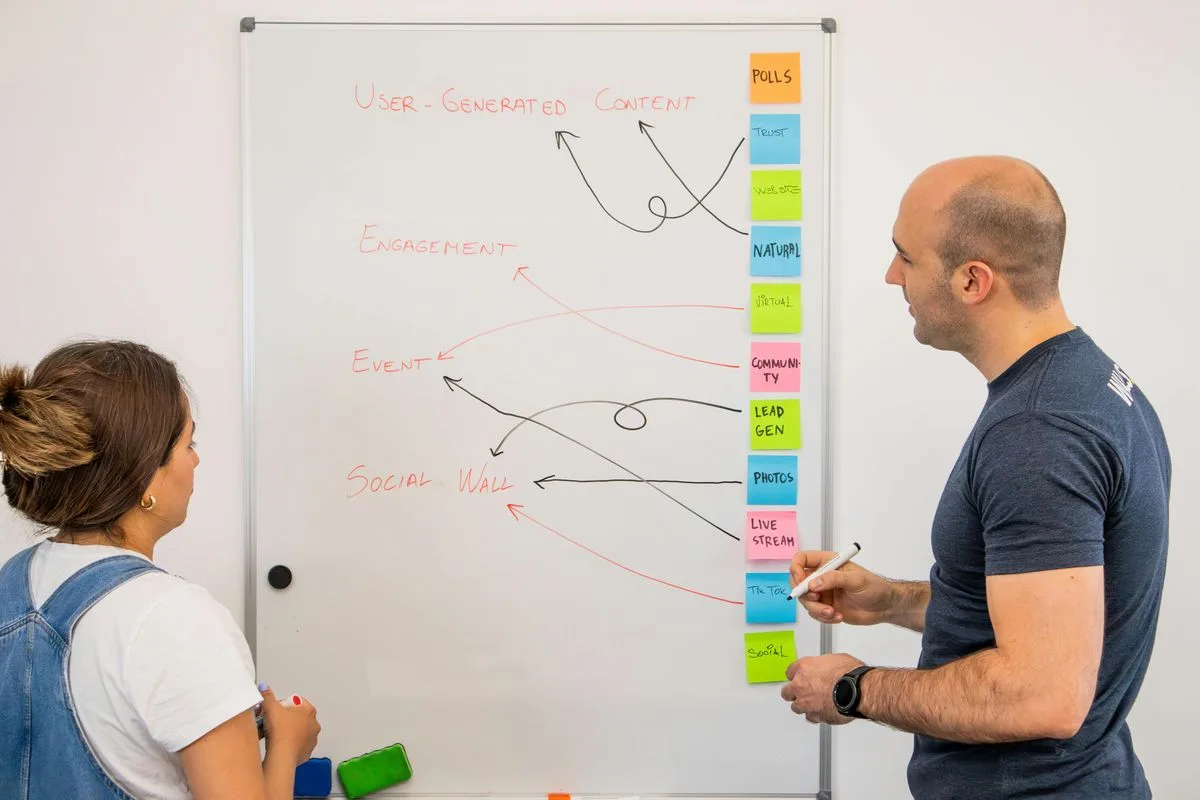Growleady Team
Lead Generation Experts
B2B Sales Job Description: Roles, Skills, and Career Path
Explore B2B sales careers: key skills, job titles, and work environments. Discover challenges and opportunities to excel in this dynamic field.

Curious about succeeding in B2B sales? You're not alone! B2B sales is a dynamic field that's constantly evolving, and understanding the job description is crucial for anyone looking to break into this exciting career path.
Understanding B2B Sales
B2B sales, or business-to-business sales, involves selling products or services to other businesses rather than individual consumers. This type of sales often requires a unique set of skills and strategies due to its complex nature and longer sales cycles.
Defining B2B Sales

B2B sales jobs are the lifeblood of many companies, driving revenue and fueling growth. Here's what you need to know about B2B sales roles:
Relationship building: You'll spend a significant amount of time identifying potential leads, reaching out to them, and nurturing relationships. It's all about understanding their needs and building trust.
Lead qualification: Research is key. You'll need to determine if a prospect is a good fit for your product or service by understanding their needs, budget, and decision-making process.
Product demonstrations: Showcasing your product or service effectively is crucial. You'll need to highlight features and benefits that align with your prospect's specific needs.
Negotiation skills: B2B deals often involve complex negotiations. You'll need to navigate pricing discussions, contract terms, and stakeholder concerns.
Industry knowledge: Understanding your industry and your clients' industries is essential. This knowledge helps you speak your prospects' language and provide tailored solutions.
Key Differences Between B2B and B2C Sales
B2B sales differ significantly from B2C (business-to-consumer) sales. Here's how:
Decision-making process: B2B sales typically involve multiple decision-makers and a longer sales cycle. In contrast, B2C sales often have a single decision-maker and shorter cycles.
Relationship focus: B2B sales emphasize long-term relationships and repeat business. B2C sales are often more transactional.
Deal size: B2B deals are usually larger in value, with higher price points and longer contracts. B2C transactions are generally smaller and more frequent.
Product complexity: B2B products or services are often more complex, requiring in-depth knowledge and customization. B2C products are typically simpler and standardized.
Emotional vs. rational decision-making: While B2C sales often appeal to emotions, B2B sales focus more on logical, ROI-based arguments.
To succeed in B2B sales, you'll need to master the art of relationship building, develop a deep understanding of your product and industry, and hone your negotiation skills. Remember, it's not just about closing a deal; it's about creating long-term partnerships that benefit both parties.
Core Responsibilities of a B2B Sales Professional
B2B sales professionals play a crucial role in driving business growth and revenue. Their responsibilities encompass a wide range of activities, from identifying potential clients to closing complex deals. Let's explore the core responsibilities that define this dynamic role.
Prospecting and Lead Generation
Prospecting and lead generation form the foundation of B2B sales success. You'll spend a significant portion of your time:
Identifying new business opportunities through market research
Generating qualified leads using various techniques
Conducting in-depth analysis of potential customers' needs and budgets
Staying informed about industry trends and competitor activities
To excel in this area, focus on developing a systematic approach to prospecting. Use tools like LinkedIn Sales Navigator or Growleady to find decision-makers in your target companies. Craft personalized outreach messages that highlight how your product or service can solve their specific pain points.
Remember, quality trumps quantity in B2B lead generation. It's better to have a smaller number of highly qualified leads than a large pool of uninterested prospects.
Building and Maintaining Client Relationships
In B2B sales, building strong relationships is key to long-term success. Your responsibilities include:
Developing trust and rapport with key decision-makers
Maintaining regular communication with existing clients
Identifying upsell and cross-sell opportunities within your client base
Acting as a trusted advisor to help clients achieve their business goals
To build lasting relationships, focus on adding value beyond your product or service. Share industry insights, introduce clients to potential partners, or offer free resources that can help their business grow.
Don't make the mistake of neglecting existing clients in favor of new prospects. Repeat business and referrals from satisfied customers can significantly boost your sales performance.
Negotiating Complex Deals
B2B sales often involve complex, high-value deals that require skilled negotiation. Your responsibilities in this area include:
Understanding the decision-making process within target organizations
Crafting tailored proposals that address specific client needs
Exploring objections and concerns from multiple stakeholders
Collaborating with internal teams to create customized solutions
To improve your negotiation skills, practice active listening and empathy. Try to understand the underlying motivations and concerns of each stakeholder involved in the decision-making process.
A common mistake in B2B negotiations is focusing solely on price. Instead, emphasize the value your solution brings to the client's business. Highlight ROI, efficiency gains, or competitive advantages they'll gain by choosing your product or service.
Remember, successful B2B sales professionals view their role as problem-solvers rather than just product pushers. By focusing on these core responsibilities and continuously refining your skills, you'll be well-positioned to excel in the dynamic world of B2B sales.
Essential Skills for B2B Sales Success

Mastering B2B sales requires a unique set of skills to navigate complex business relationships and drive results. Here are the essential skills you'll need to excel in this dynamic field:
Communication and Interpersonal Skills
Effective communication is the cornerstone of B2B sales success. You'll need to:
Build and maintain relationships with key decision-makers
Articulate your product's value proposition clearly and convincingly
Listen actively to understand client needs and pain points
Adapt your communication style to different personalities and organizational cultures
Tip: Practice your elevator pitch regularly to refine your ability to communicate your product's benefits concisely.
Remember, in B2B sales, you're not just selling a product; you're building long-term partnerships. Develop your emotional intelligence to read social cues and respond appropriately in various business situations.
Industry and Product Knowledge
To succeed in B2B sales, you must become a trusted advisor to your clients. This requires:
Deep understanding of your product or service
Comprehensive knowledge of your industry's world
Awareness of current trends and future projections
Familiarity with your competitors' offerings
Stay up-to-date by:
Reading industry publications
Attending conferences and webinars
Engaging in continuous learning about your product
Pro tip: Create a knowledge bank of case studies and success stories. These real-world examples demonstrate your product's value and your understanding of industry challenges.
Strategic Thinking and Problem-Solving
B2B sales often involve complex solutions to intricate business problems. You'll need to:
Analyze client businesses to identify opportunities
Develop tailored strategies for each prospect
Think creatively to overcome objections and roadblocks
Manage long sales cycles with multiple decision-makers
Enhance your strategic thinking by:
Practicing scenario planning
Studying successful sales strategies in your industry
Collaborating with colleagues to brainstorm solutions
Remember, in B2B sales, one size doesn't fit all. Your ability to think strategically and solve unique problems for each client will set you apart from the competition.
Common B2B Sales Job Titles and Roles
B2B sales encompass various positions, each with unique responsibilities and focuses. Understanding these roles helps you navigate career paths and identify opportunities in the B2B sales world.
Inside Sales Representative
Inside sales representatives are the frontline warriors of B2B sales. They:
Conduct sales activities remotely, primarily through phone calls, emails, and video conferencing
Qualify leads and nurture them through the sales pipeline
Provide product demonstrations and answer technical questions
Collaborate with marketing teams to generate and follow up on leads
Use CRM systems to track customer interactions and sales progress
Inside sales reps often serve as the first point of contact for potential clients, making their role crucial in setting the tone for the entire sales process.
Field Sales Executive
Field sales executives take the B2B sales experience out of the office and into the client's environment. Their responsibilities include:
Traveling to meet clients face-to-face at their business locations
Conducting on-site product demonstrations and presentations
Building and maintaining long-term relationships with key decision-makers
Identifying new business opportunities within assigned territories
Analyzing market trends and competitor activities in their regions
Field sales executives must be adept at time management and possess excellent interpersonal skills to succeed in diverse client environments.
Account Manager
Account managers focus on maintaining and growing existing client relationships. Their key duties involve:
Serving as the primary point of contact for assigned accounts
Identifying upselling and cross-selling opportunities within existing accounts
Developing account strategies to maximize client retention and revenue growth
Collaborating with internal teams to ensure client satisfaction and resolve issues
Conducting regular account reviews and presenting performance reports
Account managers play a vital role in fostering client loyalty and driving long-term business growth. They balance relationship management with strategic planning to maximize the value of each account.
Typical Work Environment and Expectations
B2B sales jobs offer diverse work environments and require adaptability to meet various expectations. Here's what you can expect in terms of work settings, travel, and performance metrics:
Office-Based vs. Remote Work
B2B sales roles typically blend office-based and remote work. You'll spend time in the office for team meetings, training sessions, and administrative tasks. But, a significant portion of your work may be done remotely, allowing flexibility in your schedule. This hybrid approach enables you to:
Collaborate with colleagues and managers in person
Access company resources and support systems
Conduct virtual meetings with clients using video conferencing tools
Work from home or other locations when not meeting clients face-to-face
The balance between office and remote work varies depending on the company's culture and specific role requirements. Some organizations favor a more traditional office-based approach, while others embrace a fully remote or flexible work model.
Travel Requirements
Travel is often an integral part of B2B sales jobs. As a sales professional, you'll likely need to:
Visit prospective and existing clients for in-person meetings
Attend industry conferences and trade shows
Participate in company-wide sales meetings or training events
Travel frequency varies based on your role, territory size, and company expectations. Some positions may require weekly travel, while others might involve less frequent trips. Be prepared to:
Manage your own travel arrangements and expenses
Adapt to different time zones and work environments
Balance travel time with office-based and remote work responsibilities
When discussing a B2B sales position with potential employers, clarify travel expectations to ensure they align with your preferences and lifestyle.
Performance Metrics and Quotas
B2B sales roles are typically driven by performance metrics and quotas. You'll be expected to meet or exceed specific targets, which may include:
Revenue goals: Total sales volume or value achieved
Number of deals closed: Quantity of successful transactions
New client acquisition: Number of new accounts opened
Client retention rates: Percentage of existing clients retained
Sales pipeline value: Total potential revenue in active opportunities
Average deal size: Typical value of closed deals
Sales cycle length: Time taken to close deals
These metrics help measure your effectiveness and contribution to the company's overall sales objectives. To succeed:
Regularly track your progress against set targets
Develop strategies to improve performance in key areas
Seek feedback and support from managers or mentors
Use sales tools and CRM systems to manage your pipeline effectively
Remember, performance expectations may vary based on factors like industry, product complexity, and market conditions. Successful B2B sales professionals consistently meet their quotas while building strong, long-term relationships with clients.
Career Growth and Advancement Opportunities
B2B sales offers numerous pathways for career growth and advancement. As you gain experience and hone your skills, you'll find opportunities to climb the corporate ladder and take on more challenging roles.
Progression Path in B2B Sales
Your career in B2B sales typically follows a structured progression path. You'll start as a Sales Development Representative (SDR) or Junior Sales Representative, focusing on lead generation and qualifying prospects. As you prove your worth, you'll move up to Account Executive or Field Sales Representative positions, handling more complex sales cycles and larger accounts.
With consistent success, you'll advance to Senior Sales Representative or Strategic Account Manager roles. These positions involve managing key accounts and developing long-term client relationships. Top performers often progress to Enterprise Sales or Global Account Management, dealing with high-value, multi-national clients.
Throughout your journey, you'll develop crucial skills like negotiation, relationship building, and strategic thinking. These skills are transferable across industries, making B2B sales professionals highly sought after in various sectors.
Transitioning to Sales Management
After excelling in individual contributor roles, you may transition into sales management. This shift requires a different skill set, focusing on leadership, coaching, and strategy development.
As a Sales Manager, you'll oversee a team of sales representatives, providing guidance, setting targets, and ensuring overall team performance. Your responsibilities will include:
Developing sales strategies and processes
Recruiting and training new sales team members
Analyzing sales data and market trends
Collaborating with other departments like marketing and product development
To succeed in sales management, you'll need to balance your sales expertise with people management skills. You'll be responsible for motivating your team, addressing performance issues, and fostering a positive sales culture.
Some B2B sales professionals choose to specialize in areas like sales operations or sales enablement. These roles focus on improving sales processes, implementing technology solutions, and enhancing overall sales effectiveness.
Remember, career growth in B2B sales isn't always linear. You might move laterally to gain experience in different industries or product lines before advancing vertically. The key is to continuously learn, adapt to market changes, and deliver consistent results.
Conclusion
B2B sales offers a dynamic and rewarding career path for those with the right skills and mindset. It's a field that demands continuous growth adaptability and the ability to build strong client relationships. Whether you're starting as a Sales Development Representative or aiming for leadership roles you'll find ample opportunities to advance and specialize. Success in B2B sales hinges on your ability to understand complex business needs provide value and meet challenging targets. With the right approach and dedication you can thrive in this rapid industry and carve out a successful long-term career.
Frequently Asked Questions
What is the difference between B2B and B2C sales?
B2B sales involve selling products or services to other businesses, while B2C sales target individual consumers. B2B sales typically have longer sales cycles, higher transaction values, and require a more consultative approach. B2B salespeople often become trusted advisors to their clients, needing deeper product knowledge and industry expertise compared to B2C sales.
What are some common B2B sales job titles?
Common B2B sales job titles include Inside Sales Representative, Field Sales Executive, Account Manager, Sales Development Representative (SDR), and Account Executive. These roles vary in responsibilities, with some focusing on lead generation and prospecting, while others manage existing client relationships or close complex deals.
What is the typical work environment for B2B sales professionals?
B2B sales professionals often work in a hybrid environment, combining office-based and remote work. Many roles require travel to meet clients face-to-face or attend industry events. The exact balance depends on the company and specific role, with some positions being primarily office-based and others involving extensive travel.
What are the key performance metrics in B2B sales?
Key performance metrics in B2B sales often include revenue targets, number of new accounts acquired, client retention rates, and sales pipeline value. Other important metrics may include average deal size, sales cycle length, and conversion rates at various stages of the sales process. These metrics help evaluate individual and team performance.
What career growth opportunities exist in B2B sales?
B2B sales offers numerous career growth opportunities. Professionals can advance from entry-level positions like Sales Development Representative to roles such as Account Executive, Senior Sales Representative, and Sales Manager. Some may transition into specialized areas like sales operations or sales enablement. Continuous learning and adaptability are crucial for career progression in B2B sales.
How important is product knowledge in B2B sales?
Product knowledge is crucial in B2B sales. Unlike B2C sales, B2B transactions often involve complex products or services that require in-depth understanding. B2B salespeople need to effectively communicate product features, benefits, and value propositions to knowledgeable business buyers. Strong product expertise helps build credibility and trust with clients.
What skills are essential for success in B2B sales?
Essential skills for B2B sales success include excellent communication, active listening, problem-solving, negotiation, and relationship-building abilities. Time management, adaptability, and resilience are also crucial. Technical skills like CRM proficiency and data analysis are increasingly important. Additionally, industry knowledge and the ability to understand complex business needs are valuable assets.


